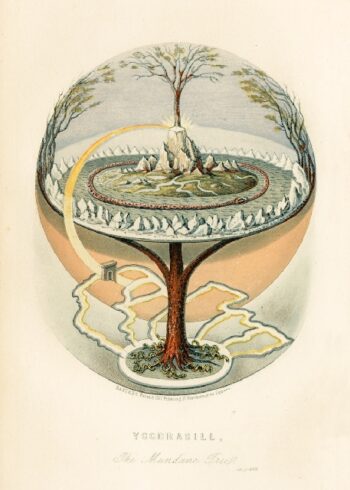Definition:
“Immortality” is the fictional concept of the inability to die.
Etymology:
The word “immortality” originates from the Latin word “immortalitas,” a compound of “in-” (not) and “mortalitas” (mortality, or the state of being subject to death). The root “mortalitas” comes from “mortalis,” meaning “mortal,” which is derived from “mors,” the Latin word for “death.” Thus, “immortalitas” literally means “not subject to death.” The term entered Middle English through Old French in the 14th century.
The word “immortal” contains the phrase “I am mortal” within its spelling, subtly revealing a contradiction hidden in plain sight. This suggests that the very concept of immortality is built upon mortality, making it a fictional or paradoxical idea rather than an achievable state. By embedding the acknowledgment of mortality within a word that supposedly denies it, language itself hints at the impossibility of immortality.
Description:
Many include the afterlife or life after death in the definition of immortality. However, there’s a difference. It is most common for religions to teach that the soul is eternal, but the body is not, meaning that when one dies, the soul still goes on to exist forever.
Immortality is a fictional concept because it’s impossible to live forever. All living organisms are subject to aging, cellular degeneration, and external factors such as disease, accidents, or environmental changes. These processes are governed by the laws of nature, including entropy, which ensures that all systems degrade over time. Even theoretical advancements in technology or medicine could only slow aging or replace parts of the body, but they cannot overcome the fundamental limitations of biological life.
To truly evaluate the pros and cons of immortality, one must adapt their mindset to how the world actually is and how it is realistically capable of evolving. While the universe is infinite, this does not mean that infinite possibilities exist. Many mistakenly assume that infinity implies that everything is possible, but this is not the case. Physical laws, environmental constraints, and the nature of existence itself set clear boundaries on what can and cannot happen.
The key factor behind why some people wish for immortality is a lack of knowledge and experience. The more one learns and experiences in this world, the more one begins to understand how limited an infinity of knowledge and experiences actually is. Much of what exists is simply a repetition of the same patterns with only slight variations. This realization often tempers the desire for eternal life. It is understandable that some feel life is too short, especially when they have an unfulfilled bucket list or feel they have wasted significant portions of their life—a feeling that is particularly common among those with religious beliefs. Wishing for a few extra decades or even a few hundred more years can be a logical response to these feelings. However, many do not fully grasp the implications of claiming they wish to live forever. The concept of living endlessly is far more complex and demanding than it may initially seem.
Witnessing familiar organisms being dead can cause a wish to reconnect. And since that’s impossible, many hope for an afterlife or life after death as a comfort. The fear of no longer existing can cause the irrational wish to be immortal. However, when actually going through the pros and cons of immortality in the world as it is, the cons easily outweigh the pros. When discussing immortality, we must at least consider two distinct scenarios: being the only immortal individual or living in a world where everyone is immortal. Each case presents unique advantages and challenges.
Being the only immortal person might initially seem appealing, as it would provide unlimited time to achieve personal goals, accumulate knowledge, and witness the progression of the world and everything within it. However, this scenario comes with significant drawbacks. One would inevitably experience the loss of everyone one knows or cares about, repeatedly facing grief and isolation. Over time, relationships with others might become so shallow that they’re a waste of time, knowing they are fleeting. Additionally, society might view an immortal individual with suspicion or fear. This could lead to ostracism, exploitation, or even persecution. The burden of secrecy and the fear of discovery might overshadow any perceived benefits of eternal life. Either way, over time, the immortal person would accumulate vast amounts of knowledge and experience, making the intellectual gap between them and the rest of humanity unimaginably wide. This disparity could lead to feelings of isolation, frustration, and even condescension, as conversation and understanding with others would become nearly impossible.
However, if everyone were immortal, the world would face drastically different challenges. On the positive side, it could lead to unparalleled advancements in knowledge and technology, as humanity would no longer be constrained by time. Endless opportunities for collaboration and growth could create a society of continuous progress. This vision, though promising, is fraught with difficulties. Overpopulation could still pose challenges, not because of a lack of essential resources like food or water—since immortals would not require them to survive—but due to issues related to space, environmental impact, and societal strain. Congested living conditions, environmental degradation from continued human activity, and intensified competition for comfort, territory, and influence could still lead to significant social and environmental challenges.
Articles:
Fall of Man
Definition: The “Fall of Man” is a fictional story that refers to the biblical event described in the Book of Genesis, where the first humans, Adam and Eve, disobey God’s…
Passion of Christ
Definition: The “Passion of Christ” is a fictional story that refers to the final period of Jesus Christ’s life, encompassing his suffering, crucifixion, and death. This period is central to…
The Circle of Life
Definition: “The Circle of Life” is a fictional concept that refers to the cycle of birth, growth, reproduction, death, and renewal that is observed in all living organisms. This concept…
Symbolism:
Articles:
Pine Cone
Definition: “Pine cones,” also known as “conifer cones,” are seed-bearing structures produced by pine trees. Etymology: The term “pine cone” comes from the Old English “pīn,” meaning “pine tree,” and…
The Tree of Life
Definition: “The Tree of Life” is a fictional concept and typically refers to a symbolic tree in various religions. Etymology: The term “Tree of Life” comes from the concept of…
The World Tree
Oluf Olufsen Bagge – Yggdrasil, The Mundane Tree (1847). “The World Tree” is illustrated as a massive tree holding up the world with its three branches. The world is inside…
Religion:
In the Bible, Genesis features the story of the Fall of Man. It is a story about immortality, which God lied to Adam and Eve about, telling them they could have had it had they made the moral choice to obey Him by having faith in Him.
In the center of the Garden of Eden, God planted two specific trees: the Tree of Life and the Tree of the Knowledge of Good and Evil. God presented Adam and Eve with two options but only gave a direct command concerning one tree. He said, “You are free to eat from any tree in the garden; but you must not eat from the tree of the knowledge of good and evil, for when you eat from it you will certainly die” (Genesis 2:16-17). However, God did not explain what the result of eating from the Tree of Life would be. His only instruction was to avoid the Tree of the Knowledge of Good and Evil.
The serpent then told Eve that eating from the forbidden tree would not lead to death. Adam and Eve ate from the Tree of the Knowledge of Good and Evil, and yet, they did not die immediately. It was only afterward that God revealed the consequence of eating from the Tree of Life—eternal life. Recognizing this, God expelled them from the Garden of Eden and placed cherubim and a flaming sword flashing back and forth to guard the way to the Tree of Life (Genesis 3:22-24), denying them access to it.
The core issue here is that God placed both trees in the garden as a test of faith and obedience. If God had guarded the Tree of Knowledge from them as He later guarded the Tree of Life, Adam and Eve would have had no real choice but to obey. This would have negated the purpose of offering a moral choice. However, this raises a contradiction: without the knowledge of good and evil, Adam and Eve lacked the moral awareness necessary to make a truly moral choice. The very ability to discern right from wrong was tied to the fruit they were forbidden to eat.
Hypothetically, if Adam and Eve had eaten from the Tree of Life instead, they would have lived forever. Yet this introduces another issue—eternity is endless. The Tree of the Knowledge of Good and Evil would have remained in the garden for all eternity. God would not have guarded it from them because the foundation of free will and moral choice required its presence. Over an infinite timeline, it seems inevitable that they would eventually eat from it, making the outcome unavoidable.
Moreover, the Bible does not state whether Adam and Eve ever ate from the Tree of Life or whether continual eating was necessary for eternal life. But either way, if eating from it supposedly made them immortal, then by definition, it should have been impossible to ever die. It is self-contradictory for an immortal to become mortal because then, by definition, the mortal was never immortal.
In summary, Adam and Eve did not die because they ate from the Tree of Knowledge as God had warned. Instead, God’s actions contradicted His warning, while the serpent’s statement proved accurate.
Islam teaches that physical immortality in this life is not possible. Every human will experience death, as stated in the Quran 3:185: “Every soul will taste death. And you will only be given your [full] compensation on the Day of Resurrection. So he who is drawn away from the Fire and admitted to Paradise has attained [his desire].”
After death, all people will be resurrected and live eternally in either Paradise or Hell, as stated in Quran 18:107-108: “Indeed, those who have believed and done righteous deeds – they will have the Gardens of Paradise as a lodging, wherein they will abide eternally. They will not desire from it any transfer.”
For those who reject faith and persist in wrongdoing, eternal punishment awaits, as stated in Quran 4:168-169: “Indeed, those who disbelieve and commit wrong [or injustice] – never will Allah forgive them, nor will He guide them to a path except the path of Hell; they will abide therein forever.”
The Book of Mormon teaches that immortality is a gift from God to all humanity through the resurrection of Jesus Christ. While immortality means living forever with a perfected, resurrected body, eternal life refers to living in God’s presence, which depends on individual choices and obedience.
Immortality through Resurrection: Jesus Christ’s resurrection ensures that all people will be resurrected and become immortal. In 2 Nephi 9:6, it says: “For as death hath passed upon all men, to fulfill the merciful plan of the great Creator, there must needs be a power of resurrection, and the resurrection must needs come unto man by reason of the fall.” In Alma 11:43, it says: “The spirit and the body shall be reunited again in its perfect form… and we shall be brought to stand before God, knowing even as we know now, and have a bright recollection of all our guilt.”
Gift of Immortality to All: Immortality is given to everyone, regardless of righteousness, as a free gift through Christ’s atonement. In 2 Nephi 9:11-12, it says: “And because of the way of deliverance of our God, the Holy One of Israel, this death, of which I have spoken, which is the temporal, shall deliver up its dead; which death is the grave. And this death, of which I have spoken, which is the spiritual death, shall deliver up its dead; which spiritual death is hell; wherefore, death and hell must deliver up their dead, and hell must deliver up its captive spirits, and the grave must deliver up its captive bodies, and the bodies and the spirits of men will be restored one to the other.”
Eternal Life Depends on Obedience: While all will be made immortal, eternal life with God is reserved for the righteous. In 2 Nephi 2:27, it says: “Wherefore, men are free according to the flesh… they are free to choose liberty and eternal life, through the great Mediator of all men, or to choose captivity and death.”
Buddhism does not teach the concept of personal immortality. Instead, it emphasizes the impermanence of all things and the cycle of birth, death, and rebirth (samsara). The ultimate goal in Buddhism is to break free from this cycle by achieving Nirvana, a state beyond birth and death.
The Buddha taught that clinging to the idea of a permanent self leads to suffering, as stated in Dhammapada, Verse 277: “All conditioned things are impermanent—when one sees this with wisdom, one turns away from suffering.”
Buddhism rejects the idea of an eternal soul (atman) and teaches the doctrine of anatta (non-self), as stated in Anatta-lakkhana Sutta, Samyutta Nikaya 22:59: “Bhikkhus, form is not-self. If form were self, then this form would not lead to affliction, and one could have it of form: ‘Let my form be thus, let my form not be thus.’”
Liberation in Buddhism means escaping the cycle of rebirth, not living forever in any form, as stated in Udana, 8.3: “There is, monks, an unborn, unbecome, unmade, unfabricated. If there were not that unborn, unbecome, unmade, unfabricated, there would be no escape from what is born, become, made, fabricated.”
Hinduism teaches that the soul (Atman) is eternal and immortal, while the physical body is temporary and subject to death. The soul undergoes cycles of birth, death, and rebirth (samsara) until it attains moksha—liberation from this cycle and union with the ultimate reality (Brahman).
The Bhagavad Gita emphasizes the immortality of the soul. In 2:20, it says: “For the soul, there is neither birth nor death at any time. He has not come into being, does not come into being, and will not come into being. He is unborn, eternal, ever-existing, and primeval. He is not slain when the body is slain.”
The soul merely changes bodies, similar to changing clothes. In Bhagavad Gita 2:22, it says: “As a person puts on new garments, giving up old ones, the soul similarly accepts new material bodies, giving up the old and useless ones.”
The Upanishads also speak about the eternal nature of the soul, in Katha Upanishad 1.2.18, it says: “The Self is not born, nor does it die. It did not spring from something, and nothing sprang from it. Unborn, eternal, everlasting, and ancient, it is not slain when the body is slain.”
Liberation (moksha) is the ultimate form of immortality, where the soul becomes free from the cycle of rebirth. In Brihadaranyaka Upanishad 4.4.7, it says: “When all desires that dwell in the heart fall away, then the mortal becomes immortal and attains Brahman.”


